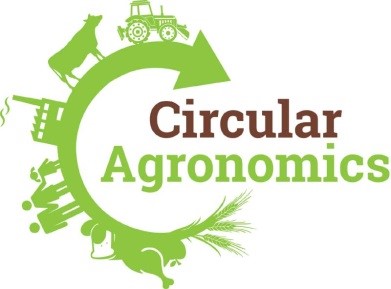GROUND-BREAKING PROJECT FOR A MORE EFFICIENT NUTRIENT AND CARBON CYCLING

Brussels, 21 st October 2018
On the 1 st September, a new project was launched which aims to find new practical ways to promote the sustainable circular management of nutrients and carbon throughout the whole agri-food chain.
If you want to follow this project through its development, please do sign up for the bi-annual newsletter here: http://eepurl.com/dJXG3Y
A good management of carbon (C), nitrogen (N), phosphorus (P) and potassium (K) is crucial to maintain a fertile and healthy soil and allow adequate plant growth and development. Currently, half of the N and P applied annually to croplands in the EU is derived from non-renewable sources such as phosphate rock or is produced by processes which consume large amounts of fossil fuels like natural gas.
It is estimated that around 13.6 Mt of N and 1.8 Mt of P enter the EU agricultural system annually in the form of mineral fertilisers and feed. However, N use throughout the whole European agri-food chain is inefficient: for every five tons of N entering the EU agri-food chain, only one ton is converted to finished products for human consumption. The case is similar for P and K. These low nutrient use efficiencies, together with poor soil management practices is leading to a loss of organic carbon in soils. This is in turn resulting in large losses of nutrients and carbon into the environment which is having a significant negative impacts on soils, water and air which constitute unacceptable health and environmental costs.
Better soil, crop and livestock management and the recovery and reuse of nutrients and carbon from manure, food waste and wastewater can help turn this situation around. Synergies between crop and livestock farming and improved soil fertility (especially soil carbon stocks) can help preserve and improve ground and surface water quality and ecosystem services which are essential to ensure food security and guarantee the sustainability of the European agri-food chain.
CIRCULAR AGRONOMICS will contribute to making the European agri-food system an integral part of a Circular Economy by increasing resource efficiency and the reuse and recovery of nutrients while addressing associated environmental challenges such as greenhouse gas (GHG) and ammonia emissions and the eutrophication of water bodies due to excessive nutrient leakage.
To achieve this, CIRCULAR AGRONOMICS will use a multi-actor and transdisciplinary approach to research and test practical solutions to these nutrient challenges at five study areas.
The aim of the actions will be to increase carbon stocks in carbon-depleted agricultural soils, reduce nitrogen surplus and related GHG emissions and increase phosphorus recovery from waste streams along the whole agri-food chain. The selected study areas constitute a variety of biogeographic scenarios and environmental challenges representative of the European agricultural sector.
The solutions will focus on the production of novel soil organic amendments, improving crop and grassland management to optimise nutrient cycling, addressing livestock management to minimise GHG emissions and contributing to the valorisation of recovered nutrients and carbon through the processing of manure, digestate and food waste as well as the treatment of wastewater from food-industries.
The experience at the study sites will be reinforced by an exhaustive environmental assessment and an exploitation plan for industrial partners. These, together with a strong dissemination of project activities to different stakeholders will be crucial to ensure the impact of the project and the long-term viability of the proposed solutions and their integration into European policy.
ASIO, spol. s r.o. is leading one of the six Case studies throughout Project. This Case Study covers South Moravian region as an example of hot continental climate with cropland and livestock farming and a presence of the food- and drink industry. Challenges are to considerably reduce high nutrient losses from food-production and food waste and increase recycling to farms. Demonstration will be held by C-rich product addition to the soil. Waste products from food industry (esp. dairy industry) will be targeted. Demonstration will be practiced on maze and winter wheat crops. Furthermore, Asio focus on development of novel technology of electrospun nanofibrous membranes as separation step in dairy industry.
CIRCULAR AGRONOMICS is a consortium made up of 18 members. The project receives funding from the European Union’s Horizon 2020 research and innovation programme under grant agreement No 773649.
The consortium:
INSTITUT DE RECERCA I TECNOLOGIA AGROALIMENTARIES , Spain
KWB KOMPENTENTZZENTRUM WASSER BERLIN GEMEINNUTZIGE GMBH, Germany
WAGENINGEN UNIVERSITY RESEARCH , Netherlands
INSTITUT FUR AGRAR-UND STADTÖKOLOGISCHE PROJEKTE AN DER HUMBOLDT-UNIVERSITÄT ZU BERLIN (IASP) , Germany
TECHNISCHE UNIVERSITAET MUENCHEN , Germany
HOEHERE BUNDESLEHR- UND FORSCHUNGSANSTALT FUER LANDWIRTSCHAFT RAUMBERGGUMPENSTEIN , Austria
CENTRE DE RECERCA EN ECONOMIA I DESENVOLUPAMENT AGROALIMENTARI-UPC-IRTA , Spain
TEAGASC - AGRICULTURE AND FOOD DEVELOPMENT AUTHORITY , Ireland
FONDAZIONE CRPA STUDI RICERCHE , Italy
THE RURAL INVESTMENT SUPPORT FOR EUROPE FOUNDATION , Belgium
SOGESCA s.r.l. , Italy
PONDUS Verfahrenstechnik GmbH , Germany
EMA DEPURACIO I ENGINYERIA DE L'AIGUA SL , Spain
Nutrients Recovery Systems , Belgium
Eastern Africa Farmers Federation , Kenya
ASIO SPOL SRO , Czech Republic
Soepenberg Fertilizers BV , Netherlands
Agroscope , Switzerland

For more information, please refer to the contact details below:
Dr Victor Riau
victor.riau@irta.cat
@CircularAgro
Next articles
ASIO CELEBRATES ITS 30TH ANNIVERSARY … a reason for retrospection and de-liberation as how to proceed in the future
In the turbulent waters of the nineties, a company emerged on the market that was founded as a grass root development.
Learn more …
13. 6. 2023
Polypropylene Pickling Tanks
It is a robust plastic structure, which is evidenced by the fact that the tank contains a solution of 20% acid at temperatures reaching even the level of 80 0C.
Learn more …
30. 4. 2023